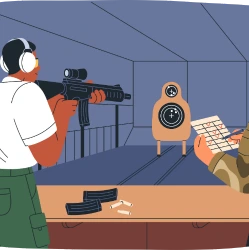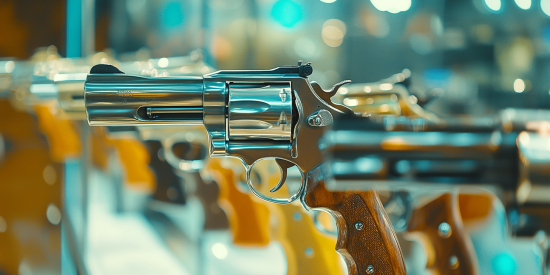If you’re ready to make your dream firearm-related business a reality in Indiana, then great news: you’re in the right place. If you wish to manufacture, sell, or import firearms in the state of Indiana (or any of the other states, for that matter), you will need to get a Federal Firearms License. The next question on your mind may be, “How do I get an FFL license in Indiana?” This article is here to help you make that process painless. This will be the first step in starting your own business in the firearms industry. Let’s get started.
Getting an Indiana FFL: An Introduction
A Federal Firearms License, or FFL, is a license issued by the Bureau of Alcohol, Tobacco, Firearms, and Explosives (ATF). It allows individuals or FFL businesses to buy, sell, and manufacture certain types of firearms. [1]ATF. “ATF“. Accessed May 23, 2024. To obtain an FFL in Indiana, individuals must submit an application to the ATF, pass a background check, and adhere to state laws and regulations. Here are the 5 easy steps for how to get your FFL license in Indiana.
Step 1: Meet All of the FFL Requirements

The first step you must consider when applying for an FFL is ensuring you meet all the requirements. The ATF sets federal regulations for everyone in all 50 states. These include things like 21 years of age, the ability to legally possess a firearm, and being a US citizen or permanent resident. Beyond the federal minimum, each state can implement its own rules and regulations in Indiana. Finally, states allow local governments to impose their own rules or zoning laws restricting a business’s location. Here, we break down the federal, state, local, and zoning regulations for becoming an FFL dealer in Indiana.

Federal requirements
As mentioned, federal requirements for getting an FFL license in Indiana are the same across the country. The ATF has set federal requirements that are pretty straightforward—essentially, if you’re of the correct age and can legally purchase a firearm, you have met most of the eligibility requirements for opening a firearms-based business.
Once you know you can pass the federal requirements, you can examine the Indiana state-specific rules and regulations.

State requirements
The state of Indiana opted to implement additional regulations beyond the federal requirements. If you want to obtain an FFL in Indiana, let’s look at the two categories of these regulations: licensing and registration.
How to Get a FFL License in Indiana: State Handgun Dealer License (SHDL)
Before you get an FFL in Indiana, anyone interested in starting a business in the firearms industry must also obtain a State Handgun Dealer License (SHDL).[2]Indiana State Government. “ISP: Apply for a Handgun Dealer License”. Accessed May 23, 2024
The first step to securing a state handgun dealer’s license is to visit your local sheriff’s office. Here, they will fingerprint you, run an additional background check, and charge you a sixty-dollar application fee. Once you get approved for the SHDL, the license is valid for six years in Indiana. You will need this license before you submit your FFL application.

Indiana Registration Requirements
The Indiana business registration requirements are simple: in effect, every business must register with the State of Indiana, as is true of every state in the US. This also means that if you registered your business in another state, like Illinois, and you are moving to Indiana, you will need to re-register.
Local and zoning requirements

Local and zoning requirements can prove to be among the most challenging to meet. If you are starting a firearms business in a large city, you may face resistance from the zoning committee. Similarly, if you wish to start a home-based FFL, you may get pushback for starting one in a residential area.
Typically if you are in a more rural area, you will have an easier time getting approved for zoning. However, if you get denied initially, it is usually because the zoning committee does not understand what business activity will look like (they may picture high amounts of customer foot traffic, for example). With that said, you may have to meet with zoning and explain how there is not heavy foot traffic for a home-based FFL business and address any other worries they have.
Step 2: Select the Type of FFL You Need
Once you have passed all federal, state, and local regulations, it’s time to choose what type of FFL you need for your new business. There are 9 different FFLs to choose from, so there will be many factors to consider when making your decision, like:
- Business model. Do you plan to manufacture, import, or deal? Are you going to be running a brick-and-mortar retailer or a home-based FFL?
- Firearms you will deal with. Are you dealing with ammunition, handguns, rifles, or a combination of these?

FFL license types
The ATF has divided the nine FFLs into three categories: manufacturing, importing, and dealing in firearms. The full list of FFL license types is available here to help you determine which best fits your business model.
Step 3: Complete an Online FFL Course
An online FFL course can be very beneficial to someone new to the firearms industry. This course will teach you as a business owner how to properly file/fill out paperwork, what firearms are legal to sell in the state of Indiana, general business skills, and any recording techniques required by the state.
Although an FFL course is not required in Indiana, it is highly recommended. Adding additional knowledge and insight to your new business can help it run smoothly and ensure you are fully aware of all laws and requirements in Indiana.
Step 4: Apply for Your Indiana FFL
Once you have passed all federal and local requirements, selected the FFL license you need, and (hopefully) taken an online FFL course, it’s time to apply for your Indiana federal firearms license officially. During this process, you will need to submit a background check to the ATF, pay the application fee, and submit your formal application. You can find the application form here: ATF Form 7/7CR.
Step 5: Have an Interview with a Representative from Your Regional ATF Office
The last step before receiving the news of your FFL application will be an interview with a local Indiana (IOI) Industry Operations Investigator. In this interview, the IOI agent will ensure you understand federal gun laws and state/local laws and have a properly zoned business. After this interview, the IOI agent will write a report to the ATF that influences the decision to approve or deny your firearm license.
FFL License Costs in Indiana
The license costs for FFLs do not change from state to state. The ATF regulates the price on the national/federal level. Depending on your business, the fee for an FFL can range from thirty to three thousand dollars.
Getting a Federal Firearms License in Indiana: Closing Thoughts
If starting a business in the firearms industry is your next career move, you’ll want to open a merchant account with a firearm-friendly payment processor. Getting your FFL will be your first challenge, but Indiana is a great place to be. Indiana has added a State Handgun Dealers License, valid for six years and not requiring additional licensing.
Still, the firearms industry is highly regulated, and your business is likely to be considered high-risk. Here at PaymentCloud, we specialize in handling high-risk merchants. Although the initial application may seem like a lot to take on, it is a very achievable goal. Reach out to see what we can do for you!
Tired of hearing “no”?
Your troubles with getting approved are over!
Approval
Rating
FFL Indiana FAQs
Do I need an FFL in Indiana?
You will need an FFL if you plan to sell, manufacture, or import firearms. A common misconception is that you need an FFL to purchase a firearm, but an FFL is only for those who plan to engage in firearm-related business activities.
Who can apply for an FFL in Indiana?
Any United States Citizen or permanent resident who can pass the federal regulations can apply to become an FFL dealer in Indiana.
Do I need to register as a business to get an Indiana FFL?
Yes, to start a firearms business, it is a state requirement that you register your business. If you previously registered your business in another state, you will need to re-register in Indiana.
How can I find an FFL dealer in Indiana?
When searching for Indiana FFL dealers, there are a few places we recommend you look:
- ATF Website: Simply enter your zip code and select “Firearms” under license type to pull up a list of local dealers.
- Google Search: You may have to do a bit of research and verification but a quick Google search is a good place to start when looking.
- The Gun Community: Another option is to ask fellow gun owners or visit your local gun shop – they may be able to refer you to an FFL dealer.
Can you have a home-based FFL in Indiana?
Yes, you can have a home-based FFL in Indiana. If you wish to start one, you will need to work with local government and zoning to ensure you are legally allowed to start a firearms business at your specific place of residence.
Can I apply for an FFL with an Indiana gun trust?
No. You cannot apply for an FFL with an Indiana gun trust.
Does the BATF&E have requirements for an FFL in Indiana?
Yes, the BATF&E, also known as the Bureau of Alcohol, Tobacco, Firearms, and Explosives or the ATF (all three names represent the same organization) is the federal agency that sets the requirements across the country. Ensuring you meet the BATF&E requirements is the first step in getting your FFL.
Do I need to apply for an SOT for my Indiana FFL?
Whether or not you need to become a special occupancy taxpayer (SOT) and get a Special Occupancy Tax (SOT) License will depend on the types of firearms you will deal with. If your business is going to sell or handle firearms like machine guns, silencers, and short-barrel shotguns, you will need an SOT in addition to your Indiana FFL. These weapons fall under the NFA category. You can see the full list of weapons in that category here.[3]ATF. “Which firearms are regulated under the NFA?”.May 23, 2024.
How long does it take to get your FFL in Indiana?
The most time-consuming part of applying for an FFL is actually complying with the state and federal gun laws and local zoning laws. Once the application is submitted, you should have your results within sixty days.
How can I transfer an FFL in Indiana?
You cannot transfer a federal firearms license in Indiana. Anyone who wishes to work in the firearms industry must apply for an FFL.
How much does an FFL transfer cost in Indiana?
FFL transfer refers to a firearm sale through a licensed dealer. Fees for FFL transfers in Indiana depend on the type of firearm and the company you’re transferring with. However, transferring a firearm in Indiana typically costs between twenty and two hundred dollars.
How hard is it to get an FFL in Indiana?
Overall, getting an FFL in Indiana is very achievable. If you can pass the federal requirements, the state has only implemented one additional licensing rule. So don’t worry if you are in Indiana. Your business can be up and running in no time.




